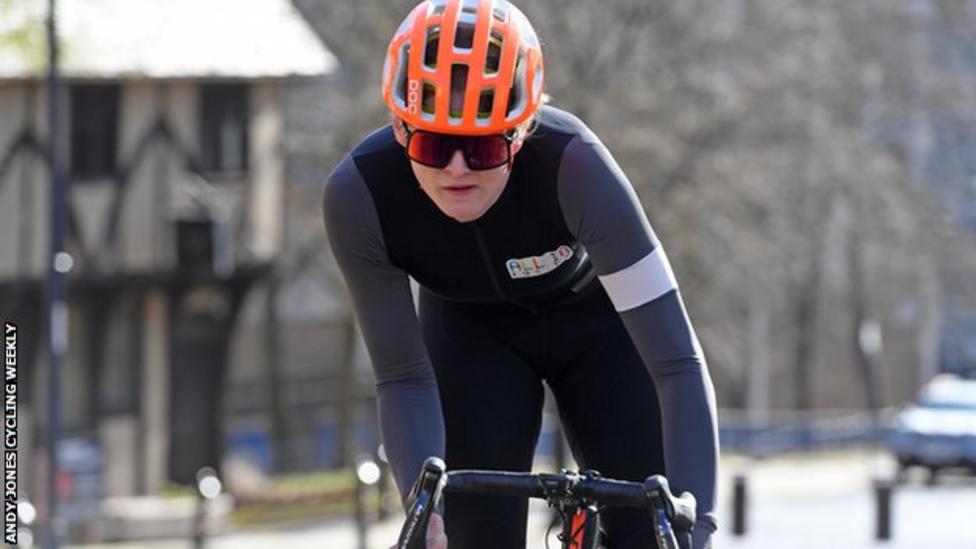British Cycling Implements New Policy Regarding Transgender Women in Competition Categories
After a comprehensive nine-month review and consultation, British Cycling has decided to prohibit transgender women from participating in the female category of its competitions. The governing body has introduced a participation policy based on the principles of fairness, requiring such athletes to compete in an ‘open category’ alongside men. Female races will be exclusively reserved for individuals assigned to females at birth.
This policy revision will have implications for cyclists like Emily Bridges, a prominent transgender athlete who may no longer be eligible for the British women’s team. Last year, Bridges faced a similar issue when the UCI, the international governing body for cycling, prevented her from competing in an elite women’s race despite complying with the rules at that time.
In response to the announcement, Bridges expressed her views on social media, describing the policy change as a “violent act” by a “failed organization” that is controlling the narrative on transgender inclusion. She criticized British Cycling for handling the situation, accusing the organization of neglecting the racing scene and engaging in “culture wars.”
Previously, British Cycling permitted transgender women to participate in elite female events as long as they adhered to testosterone-based regulations. However, due to the ongoing debate surrounding inclusivity and fairness, the governing body suspended its regulations and initiated a review.
British Cycling stated, “Research studies indicate that even with testosterone suppression, transgender women who transition after puberty retain a performance advantage.” The organization aims to uphold equality, diversity, and inclusion while prioritizing fair competition. They acknowledged the impact of the policy suspension on transgender and non-binary individuals, expressing regret for the uncertainty and distress caused during this period.
Transgender women can still participate without restrictions in non-competitive recreational and community cycling. The new policies will be implemented by the end of the year.
In her response, Bridges criticized the current state of British Cycling and its treatment of transgender riders. She emphasized the need for nuanced policy discussions, research evaluation, and engagement with relevant data specific to different sports. Bridges expressed concerns about the political nature of the debate, media framing driven by hate, and her own fear of existing in such an environment. She concluded by asserting her autonomy over her cycling career and rejecting external determinations of when she should stop competing.
What’s the background?

Emily Bridges, a highly promising competitor in junior men’s events, publicly came out as transgender in 2020 and began hormone therapy as part of her gender dysphoria treatment.
As per British Cycling’s transgender regulations, Bridges became eligible to compete in elite women’s events after maintaining testosterone levels below five nanomoles per liter for a year preceding the competition. However, shortly before the 2022 National Omnium Championships, the UCI announced that Bridges could only participate once her eligibility for international competitions was confirmed, dashing her hopes of representing Wales in the Commonwealth Games.
In response to the situation, a group of elite female cyclists urged the UCI to reconsider its rules regarding transgender participation, expressing concerns about fairness in their sport and suggesting potential boycotts. Bridges described feeling harassed and demonized, expressing frustration over the lack of clarity surrounding her eligibility. She emphasized that she has no advantage over her competitors and expressed willingness to provide data to support her claim.
While British Cycling temporarily suspended its regulations, the UCI subsequently revised its guidelines, extending the qualification period to two years and reducing the required testosterone threshold for transgender women riders to 2.5nmol/L.
However, following Austin Killips’ recent victory as the first transgender woman to win a UCI women’s stage race at the Tour of the Gila, the UCI reopened consultations on the issue. The organization acknowledged the concerns voiced by female athletes regarding equal opportunities and fairness in competitive settings.
‘Paucity of research’ – British Cycling boss
“We acknowledge the limited research available at present, but we have based our policies on the existing information,” stated Jon Dutton, CEO of British Cycling.
“I am confident that the policies we have developed strike a balance between ensuring fair competition in cycle sports while providing opportunities for all riders to participate.
“We have consistently emphasized that this challenge extends beyond a single sport. We remain committed to listening to our communities, monitoring scientific and policy developments, and ensuring inclusivity in sports.”
In March, UK Athletics implemented a similar ban on transgender women participating in the female category of its competitions and events. Similar measures have been taken in swimming, triathlon, and both rugby codes.
Several studies have indicated that transgender women maintain certain cardiovascular and strength advantages over female athletes, even after undergoing testosterone-suppressing hormone therapy.
Critics of transgender athletes’ participation in women’s sports argue that this confers them an unfair advantage over their competitors and limits opportunities for cisgender athletes. However, others contend there is insufficient comprehensive research on the subject, and the scientific consensus is unclear. With only a few elite transgender athletes, some argue for greater inclusivity in sports, highlighting that exclusive categories can be seen as discriminatory.
British Cycling confirmed that its women-only community program would remain open and inclusive for transgender women and non-binary individuals, allowing them to participate in a wide range of British Cycling activities by their gender identities.

